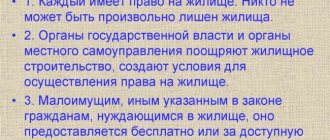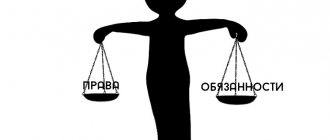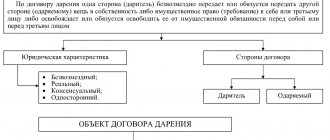Current legislation provides for the following types of rights to a land plot:
1) right of ownership (Article 260 of the Civil Code of the Russian Federation, Article 15 of the Land Code of the Russian Federation); 2) the right to lifelong inheritable ownership of a land plot (Article 265 of the Civil Code of the Russian Federation); 3) the right to permanent (indefinite) use of a land plot (Article 39.9 of the Land Code of the Russian Federation, Article 268 of the Civil Code of the Russian Federation); 4) free use of a land plot (Article 24 of the Land Code of the Russian Federation); 5) the right to limited use of other people’s land plots (easement) (Article 274 of the Civil Code of the Russian Federation, Article 23 of the Land Code of the Russian Federation); 6) lease of land plots (Article 22 of the Land Code of the Russian Federation).
The basis for the emergence of the right of lifelong inheritable ownership of a land plot
The right of lifelong inheritable possession is one of the limited real rights (Article 216 of the Civil Code of the Russian Federation).
Despite the name of Article 265 of the Civil Code of the Russian Federation, it does not contain grounds for acquiring the right to lifelong inheritable ownership of a land plot; it only refers to land legislation. However, the Land Code of the Russian Federation does not contain such type of property rights as the right of lifelong inheritable ownership of a land plot. Currently, there is only one basis for the emergence of the right to lifelong inheritable ownership of a land plot, it is inheritance by law or by will.
The subjects of the right of lifelong inheritable ownership can only be citizens (individuals), and the object can only be a land plot owned by a public entity. By virtue of clause 3 of Art. 5 of the Land Code of the Russian Federation, persons who own and use land plots on the right of lifelong inheritable ownership are classified as a special category of participants in land relations - landowners.
Main innovations
The introduced new rules regarding land surveying will greatly affect the process of registering land as sole ownership, its sale and inheritance.
Now, before performing any manipulations, it is necessary to clearly define the boundaries of the site and highlight it in nature. Based on the results, a boundary plan should be drawn up.
This change also applies to inherited land plots that are inherited for life.
If land surveying has not been carried out, then it is possible to enter into inheritance rights, but the new owner will be able to receive documents only after the procedure for determining the boundaries of the land plot has been carried out.
The right of lifelong inheritable ownership is retained by citizens who acquired it before the introduction of the RF Land Code
The right of lifelong inheritable ownership acquired by a citizen before the day of entry into force of the Land Code of the Russian Federation is preserved (Article 3 of Law No. 137-FZ “On the entry into force of the Land Code of the Russian Federation”). Consequently, the corresponding rights (Article 41 of the Land Code of the Russian Federation) and obligations (Article 42 of the Land Code of the Russian Federation) of the owners of such land plots are preserved.
The right of lifelong inheritable ownership was introduced at a time when private ownership of land did not exist. With the introduction of the Land Code of the Russian Federation and the right of private ownership of land, the right of lifelong inheritable ownership has lost its relevance and significance. Thus, after the entry into force of the Land Code of the Russian Federation (October 30, 2001), the right of lifelong inheritable ownership of land plots ceased to be granted, and currently it is retained by persons who received plots on this right before the entry into force of the Land Code of the Russian Federation, that is, until 1 March 2015. Before this date, there was an article in the Land Code of the Russian Federation devoted to the right of lifelong inheritable ownership (Article 21 of the Land Code of the Russian Federation), from 01.03.2005. she has lost her strength.
What it is
All available options for acquiring permanent or temporary rights to real estate, including land plots, are regulated by the norms of the Civil Code of the Russian Federation and the Land Code of the Russian Federation.
With the adoption of the Land Code of the Russian Federation in 2001, this method of obtaining land as lifelong inheritable ownership lost its legal force. However, plots provided under previous legislation can still be used by citizens. Lifelong inheritable ownership of plots of land is characterized by the following nuances:
- ownership rights do not arise for the plots provided, which makes it impossible to dispose of them through civil transactions (such land cannot be sold or leased to third parties);
- land is provided with an indefinite right of use, and after the death of the owner, a similar right passes to potential heirs;
- possession of a plot of land on the specified right allows the construction of residential real estate and outbuildings without restrictions, and they can be registered as the private property of citizens;
- the allocation of land under this right was carried out only to individuals; enterprises could not acquire land in this way.
The allocation of plots on the specified right was carried out from the lands of the state or municipal fund. The supporting document was an administrative act of local authorities.
The allocation of land on such grounds provided for various purposes - for the construction of individual residential buildings, for running a personal household, etc. This legal regime of land use was indicated in the administrative act of the government agency; citizens do not have the right to arbitrarily change it.
In some cases, it may be necessary to confirm the legality of land ownership in court. For example, if a citizen loses the administrative act of the authorities on the allocation of an allotment, and the documentary archive is destroyed, the fact of legal ownership can be proven through special judicial proceedings. For this purpose, testimony of witnesses, documents on payment for the right of use, as well as other forms and forms can be used.
If land is allocated to a group of citizens (for example, all family members), they have equal rights of use. This means that all adult owners of land real estate must apply for re-registration of ownership. The allocation of shares from the specified plots is not allowed; citizens can only determine the procedure for the general use of the plot.
Let us consider the legal regime of these lands, taking into account current legislative norms.
Powers of ownership and use of a land plot on the right of lifelong inheritable possession
The content of the right of lifelong inheritable ownership consists of the powers of ownership and use of a land plot.
In contrast to the right of ownership, the exercise of the right to dispose of a land plot is excluded. In other words, a plot owned by the right of lifelong inheritable ownership cannot be sold or donated . At the same time, the right of lifelong inheritable ownership can be transferred by inheritance.
Unless otherwise follows from the conditions for use of a land plot established by law, the owner of the land plot has the right to erect buildings, structures and other real estate on it, acquiring ownership of it (Clause 2 of Article 266 of the Civil Code of the Russian Federation).
Ways to accept an inheritance
You can accept an inheritance in two ways, specified in Art. 1153 of the Civil Code of the Russian Federation.
- Actual acceptance , which consists in taking actions to protect and manage the inheritance, paying taxes and taking other actions to preserve it.
- By submitting an application to a notary . The application is submitted within six months from the date of opening of the inheritance. If it is submitted through a proxy or by mail, the signature of the applicant (heir) is certified by a notary.
It is possible to acquire an inheritance only by accepting it. If the rights to receive an inheritance arose after its opening, for example, due to the refusal of other persons , the time for filing an application will be increased , but not more than three months beyond what was previously specified.
Termination of the right to lifelong inheritable ownership of a land plot
The grounds for termination of the right to lifelong inheritable ownership of a land plot are defined in Art. 45 of the Land Code of the Russian Federation.
Termination of the right of lifelong inheritable ownership in accordance with Art. 45 of the Land Code of the Russian Federation occurs in the case of:
- refusal by the landowner of his right to a land plot (the right to lifelong inheritable ownership of a land plot can be waived in accordance with clause 3 of Article 53 of the Land Code of the Russian Federation);
- forced termination of the right when using a land plot in violation of the requirements of the legislation of the Russian Federation;
- seizure of land for state or municipal needs.
Concept and brief description
In Art. 265 of the Civil Code of the Russian Federation talks about who, why and why has the right to perpetual ownership of a certain part of the land.
Nowadays, it is no longer possible to receive such a gift from the state due to the abolition of such land management. However, the evidence obtained earlier is valid, although its quantity is gradually decreasing.
There was a special boom in obtaining land plots in the distant nineties of the last century. The difficult situation of perestroika in the early 90s gave rise to a lot of contradictory, useless, and sometimes clearly negatively affecting the general state of the state laws.
Previously, people were also given plots for conducting economic activities, since 1922, but not on such a large scale. Those who took advantage of the reigning confusion of perestroika received large and elite areas for indefinite use. There were no restrictions on their number, size, or purpose.
A little later, when the flaws in the land code became clearly visible, amendments began to be made. Articles were added, still in force today, that imposed certain restrictions and protected civil rights.
Key points:
- It became possible to obtain land by contacting the administration, writing an application indicating the size of the plot, its territorial location and purpose of use. In each region of the country the standards were different.
- They can no longer be used to conduct business, and it is also prohibited to alienate them in any way other than inheritance.
- Activities on these plots are controlled by the state for compliance with the conditions of land use and compliance with land legislation.
- Land can be bequeathed or transferred into private ownership.
Despite the fact that such property cannot be sold, there is a small legislative loophole.
If there is a house on the land, registered as a property, then when it is sold or donated, the rights to the allotment are automatically transferred to the new owner of the property.
This happens because the law does not prohibit the privatization and construction of buildings on such plots, of course, if there are no contradictions with its intended use.
Inheritance of the right to lifelong inheritable ownership of a land plot
In accordance with Art. 1181 of the Civil Code of the Russian Federation, a land plot owned by the testator or the right of lifelong inheritable ownership of a land plot is included in the inheritance and is inherited on the general basis established by the Civil Code of the Russian Federation. No special permission is required to accept an inheritance that includes the specified property.
When inheriting a land plot or the right to lifelong inheritable ownership of a land plot, the surface (soil) layer, water bodies, and plants located on it within the boundaries of this land plot are also inherited, unless otherwise established by law.
In paragraph 74 of the Resolution of the Plenum of the Supreme Court of the Russian Federation “On judicial practice in cases of inheritance” it is stated that the inheritance includes and is inherited on a general basis the land plot owned by the testator or the right of lifelong inheritable ownership of the land plot (if the right a land plot belongs to several persons - a share in the right of common ownership of a land plot or a share in the right of lifelong inheritable ownership of a land plot).
The transfer of the right to lifelong inheritable ownership of a land plot is subject to state registration (based on a certificate of inheritance).
The process of a landowner registering his rights to a piece of land
According to the Land Code of the Russian Federation, state land can be acquired through an auction. A citizen with lifelong ownership has the right to do this without bidding, if there are buildings registered in his name.
If you want to buy a plot, you must consider:
- The site and the buildings on it are considered a single whole, i.e. when transferring real estate to another person, the same will have to be done with the land;
- To obtain property rights, you do not need the consent of the municipality or government representatives (Article 523 of the Civil Code of the Russian Federation); if a house has been built, the plot under it can automatically be re-registered;
- To re-register a plot of land, it is necessary to complete a purchase and sale transaction (without it, permission from the local authorities is required, subject to payment of the redemption price);
- If the land is at the disposal of several people at once, they must all apply for re-registration (allocation of shares is impossible).
To re-register with a full package of papers, you must contact Rosreestr or MFC. An employee of the institution will accept all the documents and issue a receipt of what exactly he received and set the deadline for when the extract from the Unified State Register can be collected (from 2021, a certificate of land ownership will not be issued, all information is available in this paper).
Documentation
To register rights you need :
- An act on the provision of land and the right to it, issued by an authority within its competence;
- An extract from the household register on the existence of rights, provided by the authorized bodies (when the land was provided for personal farming);
- Cadastral passport (with mandatory indication of the boundaries of the site);
- Passport or other identification document within the framework of the law of the Russian Federation;
- Receipt for payment of the state fee;
- A certificate from the tax office that there are no restrictive measures in relation to the allotment (for example, no seizure has been imposed);
- A document from the tax service that there are no debts on mandatory payments for land (if there are any, they must be repaid);
- Valuation report.
Along with all documents, it is necessary to submit an application for registration of property rights, written according to the model established by Russian legislation. The form is issued by Rosreestr or a multifunctional center.
Such a package of documents is established by Art. 49 of Federal Law No. 217 “On State Registration of Real Estate”.
If any paper confirming your rights is lost, it can be restored at the local government, city municipality or authorized committee. If this cannot be done (for example, the archive is destroyed), you can prove your ownership of the site during special legal proceedings. It is necessary to attract witnesses, provide receipts for expenses on the allotment (for example, for payment of land tax), etc.
Land valuation
Without this document, it will not be possible to re-register the land as a property.
The procedures are carried out by the local land committee where the plot is located. For valuation work, a special commission is convened, which collects and studies the necessary documentation, selects the appropriate valuation method and sets the cost.
After this, a report is created, which is submitted to the authorized body along with other papers.
Deadlines
It takes a week to re-register. However, the deadline may be extended if there are problems with the documentation.
For example, no work was done to set boundaries (they are only approximate). It will be necessary to involve a cadastral engineer and coordinate the markings with the neighbors. After this, the specialist will carry out the necessary work and draw up a corresponding act, which must be submitted to Rosreestr or the MFC.
Taxation
To register ownership of a plot of land, you must pay a government fee. Without a payment receipt, no action will be taken. The fee is 2,000 rubles .
Procedure for registration of ownership or possession
The inheritance procedure begins with filing an application with the notary office where the will was drawn up. In most cases, this is at the place of registration of the deceased. In a big city, such as Moscow, there are many notary offices in every district. They contact the one that deals with people whose last name begins with a certain letter required by the applicant. You must have identification documents with you.
If it was necessary to make sure that the plot was not willed, an inheritance case is also initiated. However, the distribution is made according to the law. The same six months are allotted during which successors submit applications for inheritance. The notary is looking for property, in addition to the land plot, as well as applicants who may have the right to receive valuables. As a result, a certificate is issued that allows you to re-register the plot in your name.
The registration procedure involves contacting the registration authorities. The procedure is available to persons who are legal successors, as evidenced by the presence of the document. This requirement should not be neglected. Without registration, the plot cannot be sold, donated, bequeathed, or exchanged. It is also not recommended to artificially lower the value of land, because these manipulations fall under the scope of the Tax and Criminal Codes of the Russian Federation.
Actions of the heirs
The future owner must:
- Prepare a package of documents.
- Appear before the notary.
- Submit an application for acceptance of inheritance.
- Re-register the land plot.
The case will go faster if you involve a specialized lawyer.
What will happen to the allotment if no heirs are found?
In this case, six months after the death of the testator, the land becomes the property of the state. The successor is the local municipal authorities, which subsequently manage the land. The same thing happens if the deceased citizen has relatives, but they did not want to inherit and abandoned the property. The process is reversible.
If the lack of requirements is due to the heir’s ignorance that it is time to write a statement, or the person could not physically do this for six months, a claim can be filed. The requirement is to extend the period of inheritance and transfer the land plot to the legal successor. But compelling circumstances are required to justify the delay. You can file a claim within three years. Otherwise, the land plot will remain the property of the state represented by municipal local government bodies.







